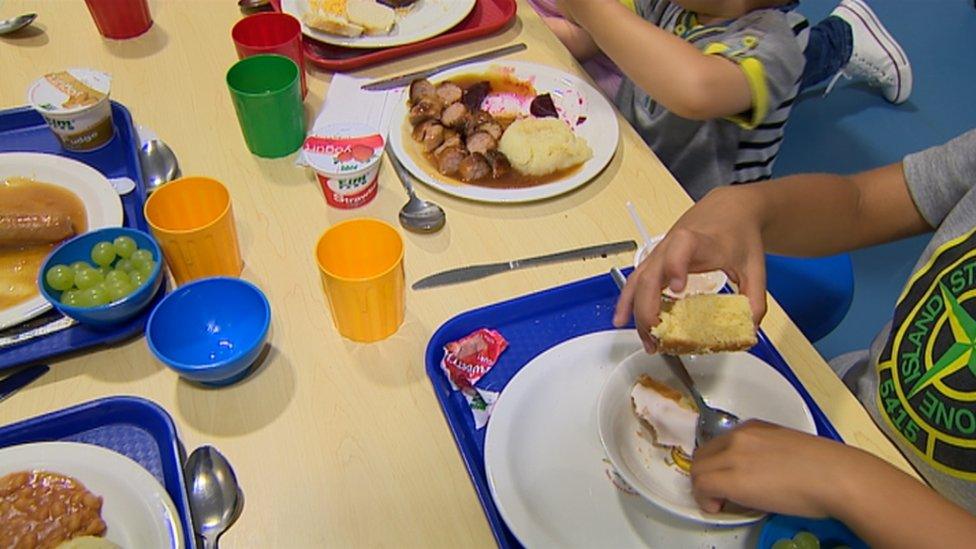Free school meals in Wales: Cold, healthy option idea
- Published
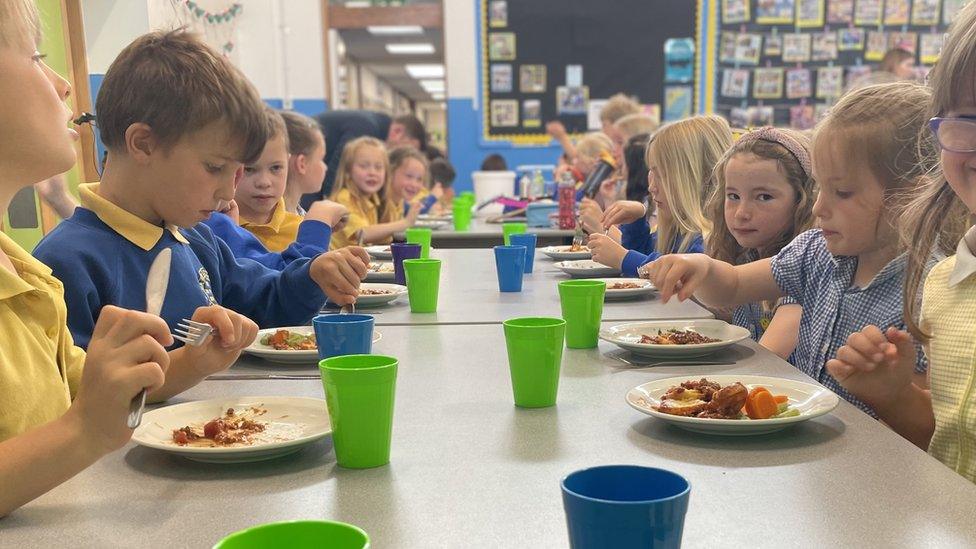
The school kitchen at Ysgol Twm o'r Nant, Denbigh will be getting new equipment to prepare nutritional meals
Serving cold, healthy food rather than a hot lunch could help schools overcome the challenges of extending free school meals to all primary pupils from September, a think-tank has said.
Free meals will gradually be extended to all children between four and 11, starting with the youngest.
But there are concerns about whether schools will have enough staff and space to deliver the pledge.
The Welsh government says it is working to overcome logistical challenges.
The Bevan Foundation said, in a recent report, that the "lack of detail on the scale, pace and method" of rollout meant there were "several crucial questions" that remain unanswered.
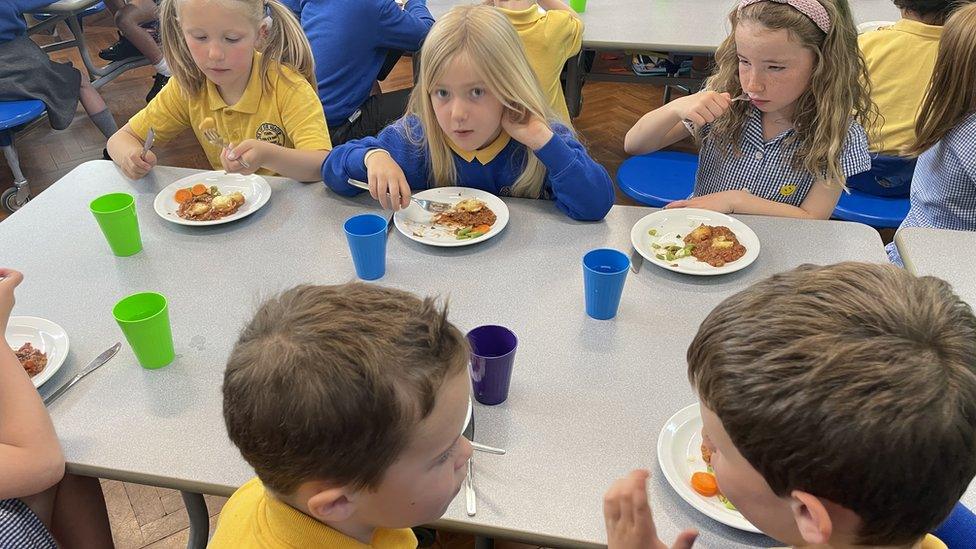
Children could be given a healthy cold meal to make it feasible to provide free school meals for all
The questions include which children will start getting free meals in September, under the plan agreed by Labour and Plaid Cymru.
The Welsh government has said it will begin with "some of the youngest pupils" with speculation it could start with reception classes before being extended to more children in following months.
The Bevan Foundation said it could mean that some older primary children will not receive free school meals until September 2025.
In January 2021, 23.8% of all primary pupils in Wales qualified for free school meals.
The Welsh government estimates an additional 180,000 children will become eligible under the promise to extend it.
'Flexibility matters'
Dr Steffan Evans, head of policy at the Bevan Foundation, says the pledge to extend free school meals is an "excellent principle".
He believes the Welsh Government should permit local authorities to serve healthy, cold meals in schools whose facilities are not ready for the immediate roll-out of universal hot food.
"In the short term to get as many children benefiting from this policy as possible then having that flexibility I think is important," he said.
"We know more and more families are going to struggle this winter as costs rise so making sure we get as many children as possible benefiting from the provision of healthy free meals, even if it is cold meals, I think would be welcomed by most families whilst we increase capacity in the long term."
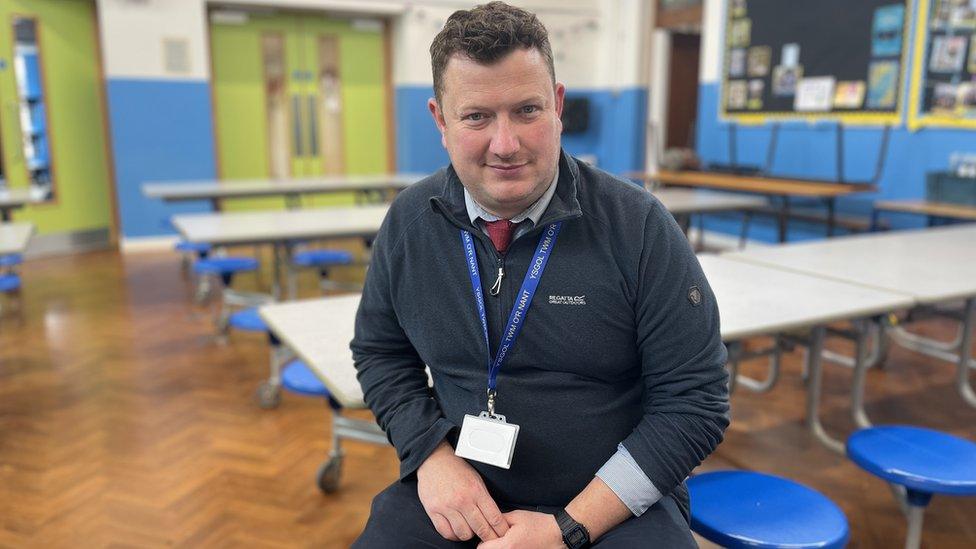
Head Teacher Dafydd Elgan Davies says the new policy will help parents struggling to pay for meals
What one school in Denbigh plans to do
In Ysgol Twm o'r Nant primary school in Denbighshire, around 9% of the children are eligible for free school meals.
The headteacher Dafydd Elgan Davies said the new policy will have a "great impact" on parents who struggle to pay for school meals and it will give "more of a level playing field".
He believes the school is well placed to increase the number of meals and staggered lunchtimes, introduced during the pandemic, will help.
Cook Jane Jones is looking forward to the challenge
The school kitchen will be getting new equipment and combi ovens and the county has brought in a new menu that is "nutritional and good value for money" but "easier to cook", according to head cook Jane Jones, a former Wales School Chef of the Year.
"I'm looking forward to seeing more children having a nice, warm lunch and going forward in the afternoon to do whatever they have to do", she said.
She acknowledges staffing could be a challenge.
"The county have started the drive to recruit more people but I do understand that sector is suffering at the moment," she says.
"We're hoping that someone will want to come and work with us here."
And what about extra hours for the kitchen staff?
"Potentially, yes," she adds, "but that's fine because I love to cook."
'Disadvantaged must be supported'
There are nearly a quarter of a million primary school pupils in Wales.
Research by BBC Wales has found that around 40% of them currently have school meals, free or paid-for.
According to local authorities, hundreds of primary schools require new equipment to increase the provision of school meals, and several schools need extensions to their existing kitchens.
All but six of Swansea's primary schools will need some sort of upgrade or extension.
Of Caerphilly's 73 primary schools, two need kitchen extensions, four require "moderate" works, and 65 will need "additional heavy equipment."
Three of Bridgend's schools will need an extension and 41 will need upgrading.
Laura Doel, director of the National Association of Headteachers Cymru said that there was full support for the ambition of extending free meals but there was a need to be "realistic about the challenges".
They include infrastructure, supply chain issues, how wastage will be managed and longer term funding, she said.
"We don't want pressure on the system to result in those learners for who school lunch is their only cooked meal to receive a lesser offer. We must ensure the most disadvantaged are supported," Ms Doel added.
The Welsh government said every primary school pupil would be able to have a free school meal by 2024.
It said £225m was available to support councils with the roll-out so they could deliver "a high quality and nutritious meal offer to pupils."
"We need to balance the pace of rollout with the capacity of Local Authorities and schools to establish the necessary infrastructure to deliver quality, safety and not disadvantage current recipients", a spokesperson said.
"We will make a further statement on the roll-out in due course".

FANCY A STROLL?: Welsh walks to try this summer
WILD MOUNTAINS OF SNOWDONIA : Five farming families open their gates and share their lives

Related topics
- Published10 May 2022
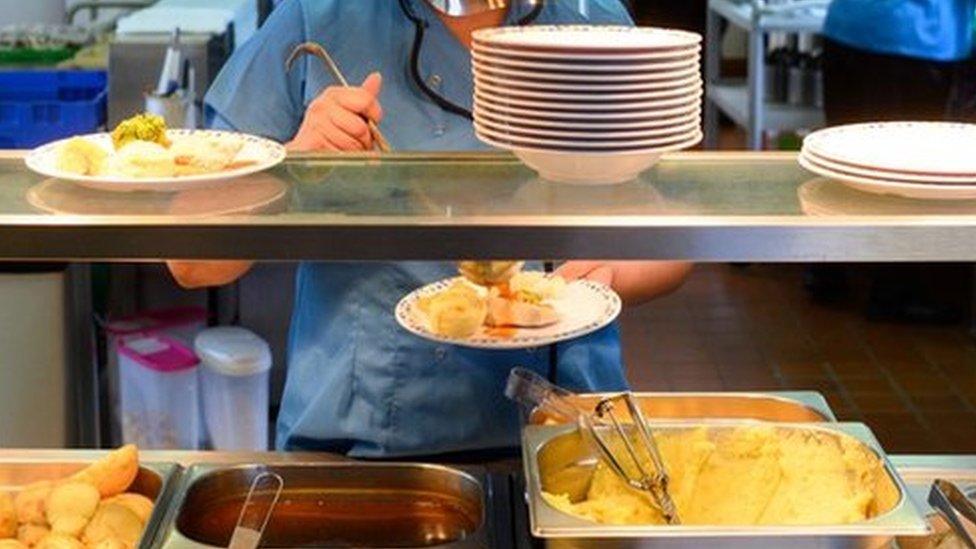
- Published25 March 2022
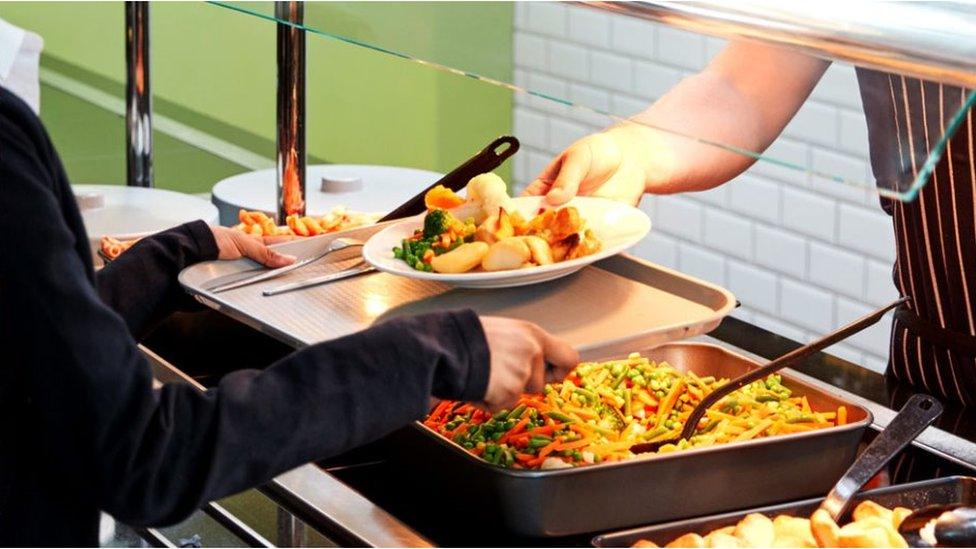
- Published30 March 2022
